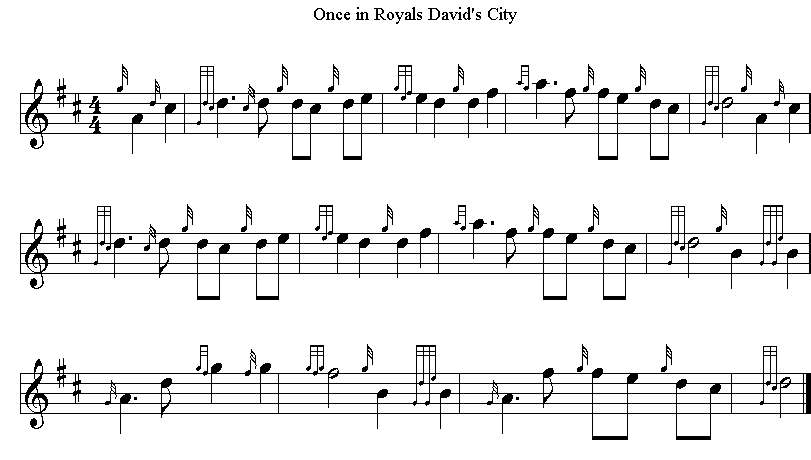 |
||||

Best viewed in
|
Once in David's Royal City “Once in David’s Royal City” was originally written as a poem by Cecil Frances Alexander. The carol was first published in 1848 in her hymnbook Hymns for Little Children. was composed by Cecil Frances Humphries in 1848. As a small girl, Cecil Frances Humphries (b. Redcross, County Wicklow, Ireland, 1818; Londonderry, Ireland, 1895) wrote poetry in her school's journal. In 1850 she married Rev. William Alexander, who later became the Anglican primate (chief bishop) of Ireland. She showed her concern for disadvantaged people by traveling many miles each day to visit the sick and the poor, providing food, warm clothes, and medical supplies. She and her sister also founded a school for the deaf. Alexander was strongly influenced by the Oxford Movement and by John Keble's Christian Year. Her first book of poetry, Verses for Seasons, was a "Christian Year" for children. She wrote hymns based on the Apostles' Creed, baptism, the Lord's Supper, the Ten Commandments, and prayer, writing in simple language for children. She composed more than four hundred hymn texts. A year later (1849), the English organist Henry John Gauntlett discovered the poem and set it to music. Gauntlett was born in Britain on July 9, 1805, at Wellington, Shropshire. He became the organist at Olney church in Buckinghamshire, where his father Henry Gauntlett was then curate, and later vicar, at the age of nine. He was intended for a career in law, and he remained a lawyer until he was almost forty years of age, when he abandoned the profession and devoted himself to music. He was organist at a number of leading London churches, including St Olave's in Tooley Street, Southwark from 1827 to 1846, where he designed a new grand organ which was built, installed and perfected to his satisfaction between 1844 and March 1846, and Union Chapel, Islington from 1852 - 1861. Eventually the degree of Mus. Doc. was conferred on him by the Archbishop of Canterbury, he being the first to receive such a degree from that quarter for over 200 years. He did much to raise the standard of church music both mechanically and musically. In 1852 he patented an "electrical-action apparatus" for organs. He wrote much music and over 1,000 hymn tunes, and edited a large number of hymn books. His most famous tune is "Irby", the tune to which the Christmas carol, "Once in Royal David's City" is usually sung. Gauntlett died in London aged seventy in 1876 and was buried at Kensal Green Cemetery. This Christmas hymn was originally written to explain this part of the Apostles' Creed: “Who was conceived by the Holy Spirit, born of the Virgin Mary.” Each stanza explores part of the contrast between Jesus' divinity and humanity. The first stanza contrasts the grand idea of “royal David's city” with the lowliness of a cattle-shed, and the second, the glory of heaven, from where He came, with the poverty of earth to which He came. The hymn ends by reminding us that Christ has ascended once again to glory, where we shall see Him, as He said: “And if I go and prepare a place for you, I will come back and take you to be with me that you also may be where I am” (John 14:3 NIV).
Lyrics by Cecil Alexander
|
|||
